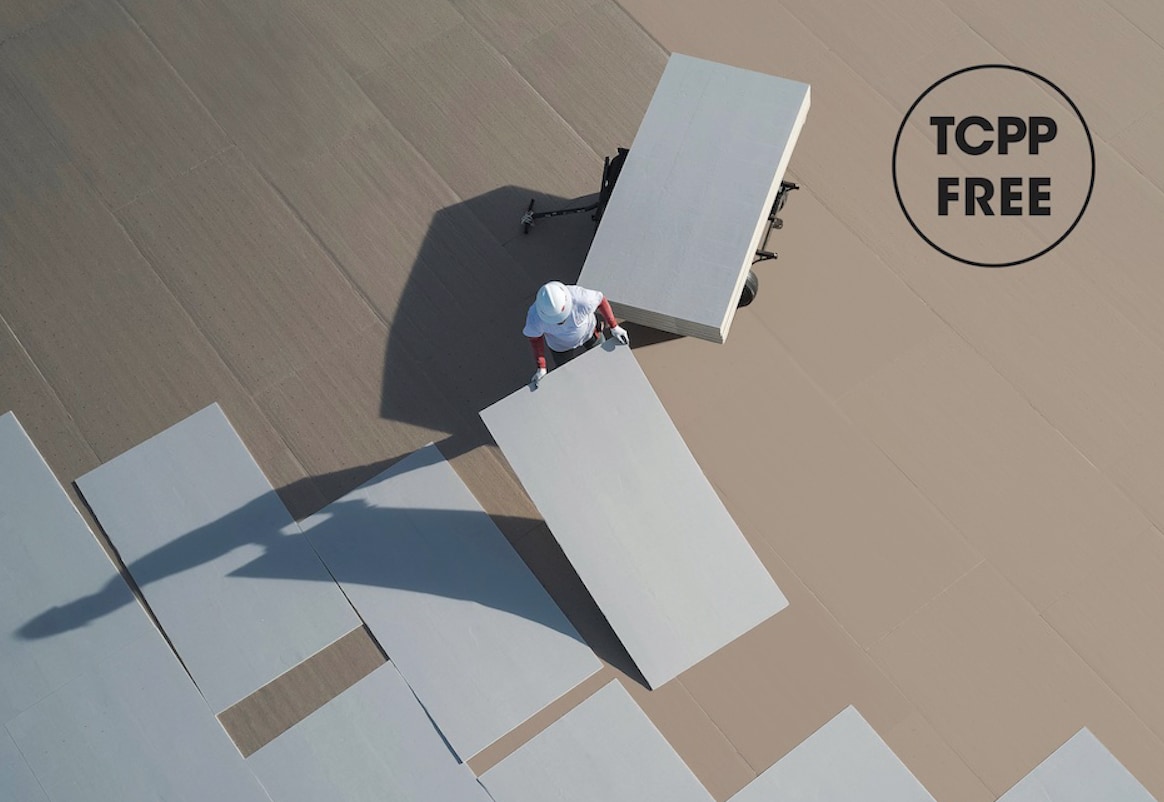Tris (chloropropyl) phosphate, commonly referred to as TCPP, has been used for years as a flame retardant in polyurethane foams, like those found in furniture, mattresses, vehicle seats, and certain building materials, such as polyiso insulation. When exposed to heat or high temperatures, TCPP releases chemicals that slow down the combustion process and reduce flames' ability to spread.
However, while TCPP's fire-retardant properties provide a level of protection and security for people and properties, this chemical may pose risks to human health and the environment. This is why TCPP-free innovations are so important to the future of insulation—and why they're now more accessible than ever.
Potential Risks of TCPP
"TCPP is on the Red List and facing bans in particular states and countries," explains Mary Schenker, GAF Director of Product Management for Insulation, Cover Boards, and Wall Control Systems. "So, in 2017, GAF released the industry's first TCPP-free insulation, EnergyGuard™ Non-Halogenated (NH) Polyiso."
What Is the Red List?
The Living Building Challenge (LBC) Red List is a listing that contains "worst in class" chemicals present in building materials that can potentially pose risks to human health and the environment. Products that disclose 100% of all ingredients at or above .01% via a Declare label and avoid any Red List chemicals in the final product are deemed Red List Free.
Building materials feature a Declare label—"the nutrition label for products"—giving manufacturers a platform to share material health information to help product specifiers quickly identify which products meet their sustainable requirements.
Benefits of TCPP-Free Polyiso
TCPP-free insulation has benefits beyond meeting these health and sustainability standards.
"Our non-halogenated product line is a two-for-one," explains Schenker. "You get to feel good about it because it's Red List Free, which means it contributes to all kinds of sustainable certifications, such as LEED, LBC, and more. But you also have the benefit that—if you're in the northern climates and worried about R-value—it's going to be constant at a mean temperature of 75°F [in the summer] and 40°F [in the winter]."
Reliable Performance
Schenker explains that EnergyGuard™ NH Polyiso features the same performance and ratings as standard EnergyGuard™, including the same code compliance, FM/UL ratings, wind uplift, performance criteria, R-value, physical properties, dimensional stability, and PSIs.
"In looking at it, it's difficult to tell the difference," she says. "You don't need to do anything differently for the installation, either. It's the exact same process as standard EnergyGuard™ polyiso insulation."
Certified Sustainable
Schenker explains that GAF manufactures a full product line of NH products, including flat, tapered, GRF and CGF facers, 20 and 25 psi, and coverboards. Additionally, EnergyGuard™ NH products with a GRF facer have GreenCircle certification for the recycled content. GAF has chosen GreenCircle, a reliable third party, to calculate recycled content by thickness of each product, whereas many manufacturers self-report and calculation criteria is unknown.
Polyiso manufacturers often rely on industry-wide Environmental Product Declarations (EPDs) developed by the Polyiso Insulation Manufacturers Association (PIMA). However, GAF made the additional investment to develop their own EPDs and make them product-specific.
"We decided we were going to spend the extra money and make ours very specific to each product," says Schenker. "There's nothing wrong with PIMA's EPDs, but they're based on an accumulation of data from all ISO manufacturers. It was important to us to make sure ours were very robust and specific to our own products."
Sustainability Without Breaking the Bank
Feedback from the architectural community indicated that they wanted to specify the more sustainable insulation—they just hadn't been able to because of the premium pricing typically associated with more sustainable solutions. Schenker explains that GAF listened to that feedback and decided to take the stance that sustainability shouldn't have to come at a premium price. So, in February 2025, GAF announced that EnergyGuard™ NH and standard polyiso would be priced the same.
Once again, GAF is setting a new standard for the roofing industry. Schenker says no other manufacturer offers a polyiso that's both TCPP-free and provides a stable R-value at low temperatures. "Because we offer both, we feel we're appealing to the architectural community regarding their concerns on sustainability and providing more to the customer."
With no TCPP, a stable R-value at low temperatures, and no price premium, GAF EnergyGuard™ NH Polyiso is suitable for all projects. See the full product line here.

